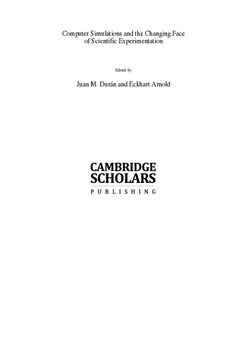| dc.description.abstract | Much of the current philosophical interest in computer simulations stems from their extended presence in scientific practice. This interest has centered on studies of the experimental character of computer simulations and, as such, on the differences (and similarities) between computer simulations and laboratory experiments. The philosophical effort, then, has been primarily focused on establishing the basis of this contrast; specifically by means of comparing the epistemic power of a computer simulation with that of a laboratory experiment. The basic intuition has been that if computer simulations resemble laboratory experiments in relevant epistemic respects, then they too can be sanctioned as a means of providing understanding of the world. The literature on the topic distinguishes computer simulations from laboratory experiments on both ontological and representational grounds. The fact that a computer simulation is an abstract entity, and therefore bears only a formal relation to the system being investigated, contrasts with a laboratory experiment, which typically has a causal connection to the target system. These ontological and representational differences have suggested to some philosophers that establishing external validity is a much more difficult task for computer simulations than for laboratory experiments. For others, however, it has been a motivation to reconsider experimental practice, and see it as a broader activity that also includes simulations as a new scientific tool. These two approaches, I claim, share a common rationale that imposes restrictions on the epistemological analysis of computer simulations. In this paper I propose to discuss this claim. The most well-known criterion for distinguishing between computer simulations and laboratory experiments is given by the so-called materiality argument. Parker has provided a helpful account of this argument: In genuine experiments, the same ‘material’ causes are at work in the experimental and target systems, while in simulations there is merely formal correspondence between the simulating and target systems [...] inferences about target systems are more justified when experimental and target systems are made of the ‘same stuff’ than when they are made of different materials (as is the case in computer experiments). (2009, 484) Two claims are being made here. The first is that computer simulations are abstract entities, whereas experiments share the same material substratum as the target system.1 The second, which is essentially epistemic, is that inferences about empirical target systems are more justified by experiments than by computer simulations due to the material relations that the former bears with the world. Current literature has combined these two claims into two different proposals: either one accepts both claims and encourages the view that being material better justifies inferences about the target system than being abstract and formal (Guala 2002, Morgan 2005); or one rejects both claims and encourages the view that computer simulations are genuine forms of experimentation and, as such, epistemically on a par with experimental practices (Morrison 2009, Winsberg 2009, Parker 2009). I claim that these two groups of philosophers, that superficially seem to disagree, actually share a common rationale in their argumentation. Concretely, they all argue for ontological commitments that ground their epistemic evaluations on computer simulations. I will refer to this rationale as the materiality principle. In order to show that the materiality principle is at work in most of the philosophical literature on computer simulations, I discuss three distinctive viewpoints: a) Computer simulations and experiments are ontologically similar (both share the same materiality with the target system); hence, they are epistemically on a par (Parker, 2009); b) Computer simulations and experiments are ontologically dissimilar. Whereas the former is abstract in nature, the latter shares the same materiality with the phenomenon under study; hence, they are epistemically different (Guala 2002, Giere 2009, Morgan 2003, 2005); c) Computer simulations and experiments are ontologically similar (both are ‘model-shaped’); hence, they are epistemically on a par (Morrison 2009, Winsberg 2009). With these three viewpoints in mind, the materiality principle can be reframed from another perspective: it is due to the philosophers’ commitment to the abstractness (or materiality) of computer simulations that inferences about the target system are more (or less thereof) justified than laboratory experiments. The principal aim of this paper is to show that philosophers of computer simulations do adhere, in one way or another, to the materiality principle. I am also interested in outlining some of the consequences of adopting this rationale. In particular, I am convinced that grounding the philosophical analysis on the materiality principle, as most of current literature seems to do, places a conceptual corset on the study on the epistemological power of computer simulations. The philosophical study on computer simulations must not be restricted to, not limited by, a priori ontological commitments. By analyzing themes in the literature, then, I show that the materiality principle does not engender a helpful conceptualization of the epistemic power of computer simulations. I will also give some suggestions as to how to circumvent this issue and address the epistemology of computer simulations at face value. The paper is divided in a way that corresponds to the three uses of the materiality argument listed above. The section entitled ‘the identity of the algorithm’ discusses option a); the section entitled ‘material stuff as criterion’ addresses option b), which comes in two versions, the strong version and the weak version; and finally option c) is addressed in the section entitled ‘models as (total) mediators.’ | es |





